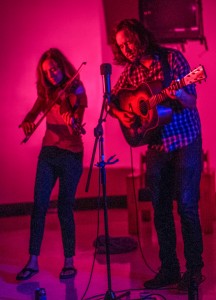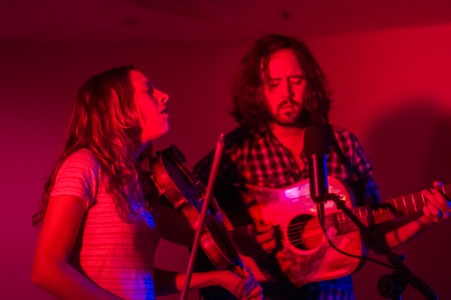
This Tuesday night saw Grinnellians enjoying the musical stylings of Leif Vollebekk and Mandolin Orange, two folk and bluegrass-influenced acts who actually ended up playing together for their last song.
Vollebekk sounds like some of the recently popular folk musicians, most notably evoking comparison to Tallest Man On Earth. He was a quiet, vibrant presence on stage, a subdued and friendly personality.
Vollebekk’s musicality was remarkable. After his first show, he moved from the guitar to the piano and played his second song over synth-sounding piano. After that, he skittered over to a violin and recorded a light melody before going back over to the piano and layering his melody playing over it. It was refreshing to see an artist so comfortable with experimentation in front of a crowd, and it was clear that Vollebekk carried on with confidence.
“I diffuse all awkward situations with humor,” Vollebekk said during the show, in between asking if there were any continental philosophy majors and complementing the audience for being so receptive, which was “heartwarming for a Canadian.” With Vollebekk’s eclectic musical talent, it’s a surprise he isn’t a Grinnellian himself!
For such a lighthearted character, though, some of Vollebekk’s songs were surprisingly melancholic. He brought up distant locations like Paris and Montreal alongside achy lines on heartbreak. The aura of nostalgia that Vollebekk managed to create was palpable among the large turnout. A handful of students took seats on the ground, making Gardner seem more like an outdoor concert.
The warm environment Vollebekk created was in no small part thanks to his dedication to his craft, something he’s improved since going on the road.
“Performing in front of people, sometimes you try a song, and it falls flat. You learn a lot about songwriting. You learn how to be more confident, how to find the beauty in a song,” Vollebekk said. “You learn fast. Songwriting isn’t like talking to people. You can be more open. Say things that you wouldn’t otherwise.”
Mandolin Orange is a folk and bluegrass duo comprised of Andrew Marlin and Emily Frantz. Frantz played the violin and sang while Marlin played the guitar, the mandolin and sang alongside her. Both were clearly talented musicians, and their music had a timeless quality only emphasized by gorgeous violin strings by Frantz and quick picking by Marlin.
Like most great bluegrass bands, the duo mixed stories of love in with serene nature metaphors. One of their songs contained a touching metaphor for heartache. “She came along like she was hiding some deep secret / but now she’s gone and I carry on to keep it / The cows are grazing, boys, the fishing’s getting good / If fate’s an old woodpecker, I’m an old chunk of wood,” the band sang.
Deciding to take a different route with another song, however, Marlin described its origin story: “You guys have all seen Lord of the Rings, right? This story is about one of the horses that goes in to fight the Orcs. But he decides not to, he’s like, ‘Nope, not me.’ And he runs away.”
After the show, Marlin shared some of his views on his musical influences that shed some light on how the band approaches performing. “On the road, you get to missing home. But being with the other bandmates helps, because we all like bluegrass,” Marlin said. “Old bluegrass songs show me we all got something in common. Where we started and where we grew up.”
The band’s common musical influences were evident in the last song Mandolin Orange played, where they invited Vollebekk on stage to perform with them. When the three of them began playing together, it was hard to believe they weren’t already a three-piece act.
For what Marlin described as a funeral dirge, the band’s last song was inspiring in its fluidity and emotional resonance. Equally enjoyable to watch was the band’s banter. Instead of playing in a basement on a cold rainy night, they seemed more like a group of friends playing for a hometown bar. With Vollebekk’s tender voice carrying most of the songs vocals, partnered with Mandolin Orange’s soft and direct instrumentality, the song was a great close to the night.























































